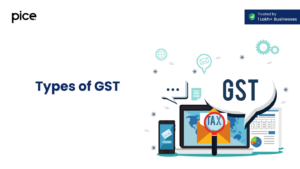Impact of GST on Indian Businesses
- 11 Sep 24
- 12 mins

Impact of GST on Indian Businesses
Key Takeaways
- GST has simplified the taxation system by consolidating multiple taxes, benefiting businesses through reduced compliance burdens.
- Retailers and wholesalers benefit from the input tax credit (ITC), lowering their tax liability and promoting transparency in operations.
- GST has reduced costs in sectors like agriculture, automobiles, and FMCG, making logistics more efficient and boosting growth.
- The GST system has formalized businesses, particularly startups and freelancers, encouraging compliance and fostering business expansion across states.
- Leveraging GST compliance and ITC helps businesses improve cost management, enhance supplier relations, and access a larger national market.
The impact of GST on business has been significant, compared to the previous tax regime. It has helped businesses improve operations with a streamlined taxation structure. Learn about what GST is and its impact on various businesses and sectors. Further, learn how to leverage GST for business growth and strategies to be compliant with current tax laws.
What Is Goods and Services Tax (GST)?
The Goods and Services Tax (GST) Act came into effect in July 2017. It is a unified indirect taxation system that replaced taxes like value-added tax (VAT), service tax, and excise duty. The GST Act aims to replace the double taxation system that prevailed in the country prior to passing the Act in 2017. In this taxation system, the end-user bears the tax liability for goods and services consumed.
Impact of GST on Different Players in the Market
Here are the impacts of GST on wholesalers, retailers and service providers:
Impact of GST on Wholesalers
Wholesalers are a crucial part of the supply chain in India. The introduction of GST ensured transparency between wholesalers and the government, thereby reducing incidents of tax evasion.
Proposed reforms that are likely to shift towards a lower tax tier will significantly help wholesalers practise a fair taxation system. Streamlined operations after the introduction of GST ensure accountability and efficiency of wholesalers to promote resilience in the wholesale ecosystem for growth.
Impact of GST on Retailers
The introduction of GST has helped retailers claim input tax credit (ITC), improving their financial condition with reduced tax liability. The current tax regime has streamlined the unorganised retail sector that predominantly deals in cash.
Streamlined operations, in turn, help retailers facilitate transparency and efficiency in business management and taxation. This ensures the expansion of the market by retailers in new areas.
Impact of GST on Service Providers
Service providers include IT services, telecommunications, insurance, business support and banking. The impact of GST on businesses such as service providers is as follows:
- Tax Distribution: The concentration of tax payments within the sector has been prominent as the top 50 service providers contributed to the tax collection process at the national level.
- Major Contributors: The above-mentioned industries played an integral role in tax collection making it an activity of economic significance.
- Unified Market Advantage: The introduction of the GST Act helped service providers across India reduce compliance burdens due to improved transparency in the unified market.
Impact of GST: Sector-Wise Analysis
The following are the sector-wise impact of GST:
Impact of GST on Agriculture:
Before the implementation of GST, the agricultural sector was subject to challenges pertaining to the transportation of goods and the cost of machinery. The introduction of GST helped the sector alleviate the challenges with reduced cost of heavy machinery used to produce agricultural commodities. Even though the tax on fertilisers and tractors has been revised to 12% with GST implementation marking an increase, it has helped taxpayers in the sector claim input tax credit (ITC).
Impact of GST on Automobiles:
Prior to the GST introduction, the automobile sector had to bear multiple taxes such as excise, VAT and others at a rate ranging between 26.50% to 44%. However, with the GST Act passed, the sector now operates with a unified taxation system.
The new taxation system has helped the sector simplify tax structures for vehicles and other components with a reduced GST rate of 18% and 28% for cars and bikes respectively. Buyers now have to pay GST and cess with a reduced tax burden.
Impact of GST on FMCG (Fast-Moving Consumer Goods):
The introduction of GST has helped the FMCG sector experience cost-effectiveness in terms of logistics and distribution. As the number of depots has been reduced in the new taxation system, it has effectively enhanced operational efficiency.
Impact of GST on Freelancers:
Under the GST system, freelancers are classified as service providers. As a result, the GST system has a simplified tax filing procedure for freelancers. This has improved accountability and transparency between freelancers and the tax authorities.
The simplified taxation system facilitates the evolution of freelancers in India. As freelancers are now well aware of their tax obligations, it promotes compliance with the Indian taxation system. Freelancers can claim input tax credits for the services they render, making it beneficial for them after the GST rollout.
Impact of GST on E-commerce:
The GST system fosters the growth of the e-commerce sector. However, the challenges that the sector faces are related to the TCS (Tax Collected at Source). Additionally, Section 194-O applies to TDS on e-commerce transactions, mandating new areas of compliance for the sector. Nevertheless, the sector is adapting to the new GST regulations and norms to comply with the taxation system in India.
Impact of GST on Logistics:
The logistics sector is one of the crucial facilitators of Indian manufactured goods consumption. Smooth operation in the sector helps increase the consumption of domestically manufactured goods.
The introduction of GST has helped the sector reduce complex operations, improving the efficiency of the organisations in the sector. Further, GST applicability has rendered cost-effectiveness to the sector, boosting domestic production.
Impact of GST on Pharma:
GST applicability in the pharma sector has helped them simplify the taxation structure. It acts as a tax relief for the sector in terms of healthcare services accessibility. GST introduction has facilitated improvements in generic drug manufacturers and medical tourism.
Impact of GST on Real Estate:
The GST system is likely to boost the benefits of the real estate sector significantly. This taxation system contributed to an organised and regulated real estate operation within the sector. Additionally, it has improved transparency and accountability of the organisations within the sector.
Impact of GST on Startups:
The GST system has eliminated state-wise VAT laws and replaced them with a unified taxation system. This has helped startups focus on growth and compliance with the Indian taxation system. It has facilitated increased registration limits for startups followed by a DIY compliance model and tax credits. This has additionally boosted the competitiveness of startups.
Impact of GST on Telecommunications:
The telecommunications industry has recorded a decrease in prices after the introduction of GST. This has helped the sector save costs in terms of simplified logistics. Further, the sector has been effective in reducing costs with efficient inventory management, witnessing a positive impact of GST introduction.
Impact of GST on Textile:
GST eliminated central excise duty for the textile industry. As a result, the cotton value chain has been significantly beneficial in terms of taxation structure. The industry is further likely to increase its contribution to annual exports with GST implementation.
Adapting to GST: Practical Tips and Strategies
Here are the strategies to adapt to GST:
- Invest in a GST-compliant Accounting Software:
You can consider integrating GST-compliant accounting software into your businesses. This will help you track the time of GST payment, due amount and due dates. Thus, you can ensure compliance with timely GST payment and annual GST return filing.
However, ensure you train your staff about the procedure to use the software. This will enhance operational efficiency while ensuring compliance with GST regulations for your business.
- Explore Financing Options:
Besides using software, ensure you estimate your GST liability. This can help you understand cash flow projections. For instance, you can understand the GST and ITC claim prospects by estimating the cash flow projections.
In case you find difficulties in terms of cash flow, you can explore financing options like small debts to manage your business functions. This way, you can ensure timely GST payment and ITC availability to bear your tax liability, ensuring compliance with the Indian indirect taxation system.
- Access Online Resources:
GST laws and regulations are complex. As a result, GST professionals, edtech institutions as well as the government conducts webinars and seminars imparting knowledge about GST laws. You can attend these to understand various ways to be GST-compliant while ensuring a streamlined operation for your business.
- Digital Record Keeping:
Digital record keeping can help you store relevant GST invoices, and records of your purchases and sales during a specific time period. You can further use these records for future reference in case you lose the hard copies of the documents. It is an effective strategy to adapt to GST laws.
Leveraging GST for Business Growth

You can leverage GST for business growth in the following ways:
Cost Optimisation:
You can optimise your costs by claiming ITC on GST. This can reduce your tax burden or output tax liability, helping you to manage cash flow in your business.
Efficiency:
You can consider integrating software to comply with GST rules and laws. The software can help you track GST payment due dates, tax liability and return filing dates.
Transparency:
When you are tax compliant, you can build an image and reputation of trust among your clients. In addition, you can maintain transparency with the tax authorities, thereby eliminating adverse legal implications on your business.
Access to National Market and Simplified Logistics:
GST introduction promotes the interstate sale of goods and services. As a result, small businesses can now access the national market, extending their businesses beyond the limited state boundaries.
As overhead expenses have been eliminated, it has become cost-effective for the businesses. They can further access logistics seamlessly for the transportation of goods with the GST system implemented.
Formalise the Business:
As GST registration ensures the formalisation of your business, you can be eligible for multiple incentives like the ITC and others under the GST system. Thus, the tax authorities can officially monitor your business activities, validating your domain of operations.
Supplier Relations:
GST compliance strengthens supplier relationships by fostering trust with your stakeholders. Hence, complying with GST rules by registering under the GST Act, 2017 can help your business improve stakeholder participation.
The Bottom Line
The overall impact of GST on business has been positive. It has helped businesses avoid double taxation or the cascading effect of taxation. Moreover, it has been cost-effective for businesses ensuring a reduction in prices. The simplified tax structure has streamlined business operations in India, regardless of their scale, ensuring compliance with GST rules.
 By
By 
















